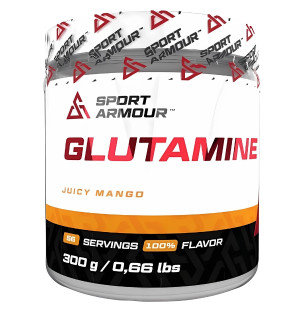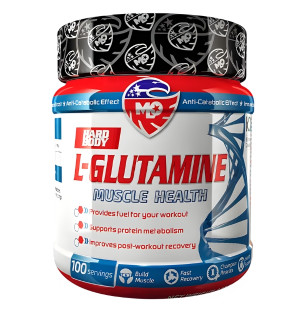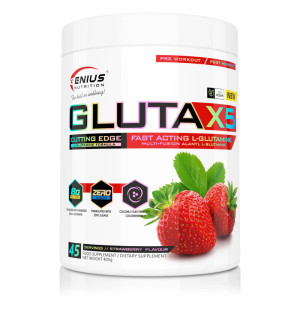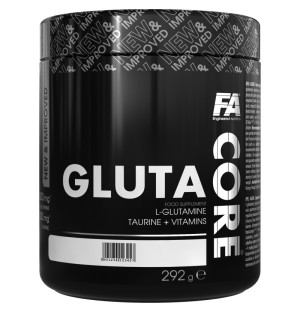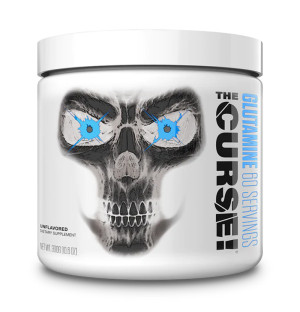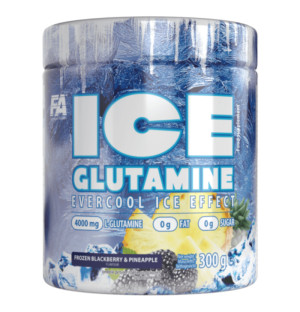Glutamine
Glutamine is one of the most important amino acids in the body, increasingly popular as a supplement supporting physical activity. Thanks to its versatile effects on the immune system, muscles, and recovery processes, glutamine has become a key element in the supplementation of individuals striving to improve sports performance and overall health.
What is Glutamine?
Glutamine is an endogenous amino acid, which means that the human body can synthesize it on its own. It is the most abundant free amino acid in the human body, constituting about 60% of the amino acid pool in skeletal muscles.
Glutamine functions as a nitrogen transporter between tissues and is involved in numerous biochemical processes. It participates in nitrogen metabolism by carrying the -NH3 (ammonia) group, which is crucial for the proper functioning of the body. Additionally, it influences metabolic processes related to kidney and liver function.
Although the body produces glutamine on its own, in situations of increased demand—such as intense physical exertion, stress, or illness—the natural production may be insufficient. In such cases, glutamine supplementation becomes a justified support for the body.
The Mechanism of Action of Glutamine
Glutamine's action is holistic—it positively affects many aspects of the body's functioning. The main mechanisms include:
- Support for protein synthesis - glutamine provides the substrates necessary for building and repairing tissues, particularly muscle tissue
- Regulation of acid-base balance - helps prevent the body from becoming too acidic
- Anti-catabolic effect - reduces the negative impact of cortisol on muscle tissue, decreasing protein breakdown
- Energy source - can be used as an energy substrate, especially during intense physical effort
- Enhancement of the immune system - supplies energy to lymphocytes and supports their function
- Ammonia detoxification - participates in the removal of toxic ammonia from the body
- Support for gut function - protects against the degeneration of the intestinal mucosa and strengthens the gut barrier
- Glutathione production - is a precursor to glutathione, one of the most powerful antioxidants in the body
Types of Glutamine Supplements
At GymHub.pro, you will find various forms of supplements containing glutamine:
Glutamine Powder (L-Glutamine)
The most basic and versatile form of the supplement, ideal for self-dosing. It is characterized by high bioavailability and rapid absorption. Available in various weights (from 250g to 1000g), allowing you to tailor the purchase to your individual needs.
Glutamine in Capsules
A convenient form for those who appreciate precise dosing and the ability to take the supplement on the go. Ideal for travel and for busy professionals.
Glutamine Complexes
Advanced formulas combining glutamine with other active ingredients, such as:
- BCAA (branched-chain amino acids) - for better recovery and muscle protection
- Creatine - for increased strength and endurance
- Vitamins and minerals - for comprehensive body support
- Probiotics - for improved gut health
Glutamine Drinks and Ready-to-Consume Preparations
Prepared glutamine solutions, ideal for those who value convenience and quick application, especially after training.
Effects and Benefits of Glutamine Supplementation
Regular glutamine supplementation brings a wide range of benefits:
Benefits for Athletes and Active Individuals:
- Faster muscle recovery - quicker return to full performance after intense training
- Support for muscle mass gain - improved conditions for anabolic processes
- Reduction in catabolism - protection of muscles from breakdown, especially during fat loss
- Improved endurance - greater availability of energy during training
- Reduced fatigue - better overall feeling after intense exertion
- Enhanced immunity - lower risk of infections during periods of intense training
General Health Benefits:
- Immune system support - strengthening the body's defense functions
- Improved gastrointestinal function - support for the integrity of the intestinal mucosa
- Regulation of insulin and glucose levels - assistance in maintaining a proper metabolism
- Enhanced cognitive function - support for the nervous system's performance
- Reduction in inflammatory conditions - anti-inflammatory effects throughout the body
- Improved appearance of skin, hair, and nails - better nourishment of tissues
- Assistance in wound healing - accelerated repair of damaged tissues
Who Is Glutamine Intended For?
Glutamine supplementation is particularly recommended for:
- Competitive athletes - individuals training intensely who need rapid recovery
- Physically active individuals - those who regularly work out at the gym or engage in endurance sports
- People undergoing fat reduction - helping to protect muscle tissue during a calorie deficit
- Individuals with increased recovery needs - those involved in physical work or exposed to stress
- People in convalescence - after injuries, strains, or illnesses
- Those concerned with immune support - especially during high incidence seasons
Glutamine may also be beneficial for:
- People with gut issues
- Individuals leading an intense lifestyle
- People engaged in mental work, seeking support for cognitive functions
Safety and Potential Side Effects
Glutamine is considered a safe supplement when used according to recommendations. No serious adverse effects have been observed with short-term supplementation at doses below 30g per day.
Possible Side Effects:
- Gastrointestinal disturbances (nausea, diarrhea)
- Dizziness
- Rapid heartbeat
- Allergic reactions (rash, itching)
- Fever, hoarseness, or cough
Contraindications:
Glutamine should not be used by individuals with:
- Kidney or liver diseases
- Liver encephalopathy
- Mental disorders
- Epilepsy
- Reye’s syndrome
Supplementation is also not recommended for:
- Children under 12 years of age
- Pregnant and breastfeeding women
We always recommend consulting with a doctor or nutritionist before starting any supplementation, especially if you have chronic illnesses or are taking medications.
Dosing and How to Use Glutamine
The optimal way to supplement glutamine depends on individual needs and goals:
Initial Dosing:
Approximately 0.8g per 10kg of body weight (e.g., for an 80kg person – about 6.4g per day)
Advanced Dosing:
For those training intensively: up to 2g per 10kg of body weight (e.g., for an 80kg person – about 16g per day)
Optimal Timing:
- In the morning on an empty stomach
- Immediately after training
- Before bed (to support nighttime recovery)
Best Combinations:
- With BCAA - for better muscle protection
- With creatine - for increased strength and endurance
- With protein - for optimal muscle protein synthesis
- With vitamins and minerals - for overall body support
Dietary Sources of Glutamine
Although supplementation is a convenient way to provide glutamine, it is also worth knowing its natural dietary sources:
Animal Products:
- Meat (beef, poultry, pork, game)
- Fish (salmon, cod)
- Seafood (shrimp, lobster)
- Eggs
- Dairy products (milk, yogurt, cottage cheese, mozzarella, ricotta)
Plant-Based Products:
- Legumes (lentils, beans)
- Whole grains
- Tofu
- Nuts and nut butters
- Seeds (pumpkin, sunflower)
- Some vegetables (asparagus, spinach, parsley, cabbage, broccoli)
- Corn
- Spirulina
Frequently Asked Questions (FAQ)
Is Glutamine Safe?
Yes, glutamine is considered a safe supplement when used according to recommendations. It is an amino acid naturally present in the body and in many food products. At doses not exceeding 30g per day, no serious side effects have been observed.
When Is the Best Time to Take Glutamine?
The optimal times are: in the morning on an empty stomach, immediately after training, and before bed. For those who train in the evening, it is recommended to take it after training and, if necessary, again the following morning. Glutamine should be taken at least 20-30 minutes apart from protein-containing meals.
Does Glutamine Help with Weight Loss?
Glutamine can support the reduction of body fat in several ways: it protects muscle tissue from breakdown (which helps maintain a higher metabolism), regulates insulin and glucose levels, positively affects gut microflora, and may reduce waist circumference in overweight individuals.
How Long Can Glutamine Be Taken?
Glutamine can be used both in short cycles (4-8 weeks) and for longer periods. For extended supplementation, it is recommended to take a 2-4 week break every 3-4 months. People training intensively often use glutamine throughout the entire preparation and competition season.
Does Glutamine Replace Protein Supplements?
No, glutamine does not replace protein supplements, as it serves different functions in the body. Glutamine is a single amino acid, while protein supplements provide a complete profile of amino acids necessary for protein synthesis. The best results are achieved by combining both types of supplements.
Why Buy Glutamine at GymHub.pro?
At GymHub.pro, we offer only the highest quality glutamine supplements from reputable manufacturers, which:
- Undergo rigorous quality and purity checks
- Contain pharmaceutical-grade L-glutamine with high bioavailability
- Are free from unnecessary additives, fillers, and allergens
- Offer the optimal balance of quality and price
Additionally, we provide:
- Expert advice in selecting the right product
- Fast shipping and secure packaging
- A satisfaction guarantee and assurance of product authenticity
- Access to a knowledge base on effective supplement use
Legal Disclaimer
The information contained on this site is for educational purposes only and does not constitute medical advice. Dietary supplements cannot be used as a substitute for a varied diet. A balanced diet and a healthy lifestyle are important for maintaining proper health.
Before starting any supplementation, it is always recommended to consult with a doctor or nutritionist, especially if you have chronic diseases, are taking medications, are pregnant, breastfeeding, or for children.
The products available at GymHub.pro meet all legal requirements and quality standards applicable in Poland and the European Union.

